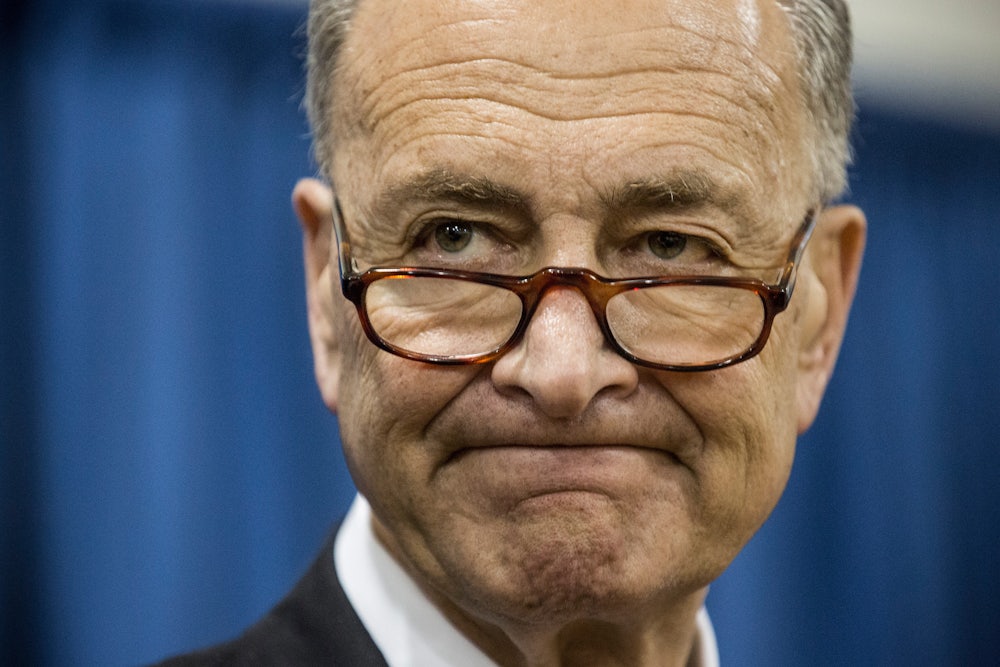After years of breathlessly positive press coverage and warm relations with the political class, Silicon Valley is facing a reckoning. Tech giants have come under scrutiny for a wide range of reasons, including the way social media networks destroy “the social fabric,” their unprecedented economic power, and, not least, facilitating the Russian government’s campaign to tilt the election to Donald Trump. Publications from across the ideological spectrum—National Review, The Nation, Esquire, Harvard Business Review—have called for reining in Big Tech, and, in some cases, breaking up tech conglomerates. The public, too, wants action taken. An Axios poll released in late February found that 55 percent of respondents wanted Silicon Valley to be better regulated—up from 40 percent in November 2016.
Given this environment, you would expect the Democrats, the only pro-regulation party left in Washington, to seize the moment. But that’s not quite what’s happened.
A recent interview that Senate Minority Leader Chuck Schumer gave to Recode’s Kara Swisher helps explain why. “For a decade, tech was a great, great thing,” Schumer said. “It allowed people to agglomerate. It allowed people who had no power, who didn’t own a newspaper, who didn’t own a TV station, who didn’t have a megaphone, to get together and have power.”
All true, but Schumer waded into some murky waters when discussing Amazon:
Amazon does great things for huge amounts of people, and they only have 3 to 4 percent of the retail market. Could it get greater? Yes! But again, I’d be careful. They are creating cheaper, better competition. Yes, they’re big. Big can do good things as well as bad things, and you’ve got to separate the wheat from the chaff. Would the world be a better place or a worse place if there were no Amazon right now? My guess is a worse place. And yet, there’s a lot of problems, for sure.
This is pretty much how Amazon would hope to be described by a Democrat. Despite the ethical and economic implications of Amazon’s metastatic growth into so many areas of the economy, Schumer still clings to the old line that Amazon and its defenders have used—that the company has ultimately been good for the market by making its competitors more efficient and by providing venues for small businesses to make money on its e-retail site.
Schumer’s 3-to-4 percent number is a favorite of Amazon’s. Yes, the company has captured more than half of e-commerce, but e-commerce still makes up a relatively small percentage of total retail sales. Thus, in Schumer’s telling, it can hardly be considered a monopoly.
Yet Amazon is on the verge of becoming the first $1 trillion company (all while paying zero federal taxes in 2017). It has staggering control over the only growing retail sector, which ultimately gives it enormous market power. Through its rapacious little-to-no profit strategy, it has not only challenged the supremacy of traditional retailers like Walmart, but has also put downward price pressure on companies across the economy, most notably in book publishing, where Amazon got its start. Amazon’s low prices may be good for consumers, but it is not so great for the companies that hire those consumers.
Schumer’s sleight of hand acts as a defense of the company’s strategy, making him out of step with his own party. In the Axios poll, 64 percent of Democrats expressed concern that the government will not do enough to regulate tech. But Schumer seems satisfied that the market will take care of the issue. Later in the interview, he had this to say about regulation: “The amount the Trump administration is doing against Russia is, appallingly, zero, almost. So it’s up to tech to do more. And I do think they’re making an effort—not only because it’s the right thing to do but because they know that down the road, their survival depends on it.”
In fact, the opposite is true. Tech companies have so much power these days that they don’t have to self-regulate. Giants like Google and Facebook and Amazon don’t have meaningful competitors, and meanwhile the minority party is signaling that the government is not poised to act.
To the extent that tech companies are self-regulating in response to criticism, we’ve mostly seen face-saving measures, like Facebook’s cosmetic changes to its NewsFeed. Schumer also expressed support for the Honest Ads Act, which would regulate ads on Google, Facebook, and Twitter and was proposed by Democrats Mark Warner and Amy Klobuchar. That bill is an overdue correction—it’s crazy that social media ads are not regulated like other ads—but does nothing about the underlying concerns about economic monopsony and media dominance.
The more generous interpretation of Schumer’s comments to Swisher is that he’s concerned about holding his party together and doesn’t want to risk a battle over regulating the tech industry while the Democrats are in the minority. The less generous interpretation is that Schumer doesn’t want to anger a valuable group of reliable campaign contributors heading into two crucial elections. Regardless, this dynamic essentially guarantees that no major tech regulation will be pushed any time soon.
